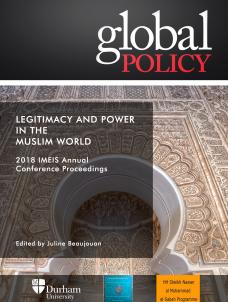
After World War I, multiple challenges to identity manifested in the Middle Eastern region, stressing the failure of the nation-state project and its inability to integrate and absorb a multitude of pre-existing identities. The wave of legitimacy and power contestation rapidly reached the whole Muslim World; from the Maghreb through the Sham and the Ural to South East Asia. Yet, as highlighted in this volume, the Muslim identity in Russia and Indonesia faces very different challenges than in Yemen or Tunisia for example.
In this context of identity disintegration, several questions arise: How to preserve the Muslim cohesion when the historical hard core of this community is plagued by contestations? Where does legitimacy go when traditional identity erodes? How to reconstruct this legitimacy when the political and social structures have been overthrown?
This e-book is the fruit of the Institute for Middle Eastern and Islamic Studies (IMEIS) third annual conference on the theme “Identity, Legitimacy and Power in the Muslim World”. It gathers insights from academics, analysts and field observers on these questions within a diverse set of national and cultural settings. Doing so, this volume offers a multidisciplinary overview of the current situation of the Muslim World in the context of multi-level identity contestations.
To download the free e-book as a PDF, for e-readers and Kindle, please click here.
Contents
Forewords from the Editor
Abstracts
Part I – Identity in Revolutionary and Post-Revolutionary Contexts
1 The Girls of Enghelab Street: Women and Revolution in Modern Iran – Kate Hashemi
2 Identity Crisis and Identity Negotiation in a Group of Post-revolution Tunisian Muslim Women – Houssem Hamrouni
3 Not So Quiet After All? The Complexities of Youth Political Engagement in Morocco Seven Years on from the ‘Arab Uprising’ – Christopher Cox
Part II – Identity as a Source of Legitimacy
4 Legitimacy Crisis and Quest for Identity in a Secular Space: The case of Boko Haram Insurgency in Nigeria – Oarhe Osumah
5 Countering ISIS Call for Hijra (Emigration): A Review through the Lens of Maqāsid Ash-Sharī’ah – Muhammad Saiful Alam Shah Bin Sudiman
Part III – The MENA Regional (Dis)Order and the Competition for Regional Influence
6 Too much leadership for such a region: The competing status-seeking behaviours of Turkey, Iran and Saudi Arabia after 2011 – Luiza Gimenez Cerioli
7 Turkey is growing into Islamic power in Central Asia: The relations with Iran, Afghanistan and Pakistan and the implications in GCC – Dr. Haifa Ahmed al-Maashi
8 Iran’s Liquid Ideology: An Analysis of the political elites’ discourse during Rouhani’s presidency – Olivia Glombitza
Part IV – What Dos it Mean to Be a Muslim? One Identity, Many Faces
9 The impact of the commemoration of Ashura on Shia-Sunni relations in Iraq – Jafar Ahmad
10 Becoming a Muslim: An Analysis of the Conversion Narratives of Women from the Post-Soviet Bloc in Jordan – Rita Adel Mohammed
11 The Agony of Development: Indonesian Muslim Traditionalist in Response Towards Environmental Crisis – Ali Ilham Almujaddidy, Anang Gunaifi Alfian and Muhamad Abdul Aziz
About the Authors
Acknowledgements
About Global Policy